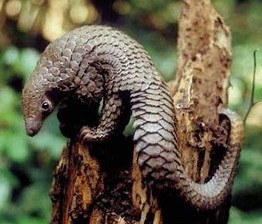 The pangolin, one of my favorite animals, recently made the news. This unusual looking anteater is being hunted to extinction due to demand for its meat and scales, which are believed to, among other things, enhance sexual prowess in traditional Asian medicine. Enforcement efforts have not been able to put a stop to the trade. Although trade in these products must continue to be illegal, and these laws must be enforced, they will not be sufficient to stem this problem. Here’s why: · Lesson from the drug war: fighting supply doesn’t work with products that have inelastic demand. When demand is not very price sensitive, limiting supply just causes the price of the product to rise, giving more incentive for people to keep supplying. Endangered species products for use in medicine likely fall into this category, as likely perceive these medical cures as a need. According to the article, an entire dead pangolin used to be valued at $5; today the scales alone go for $250. Powdered rhino horn can be more valuable by weight than gold or cocaine. That’s a pretty big incentive to break the law. · Economic conditions will continue to enable higher prices and more demand. Rising incomes in China and South East Asia, the source of much of the demand for endangered species products, will further accommodate higher prices for these products. · Creating efficient disincentives in the source countries is difficult. When deciding whether to break a law, economic actors compare the benefit of the crime with the penalty, weighted by the likelihood they will get caught. In poor countries, the resources available for enforcement are limited, so likelihood of getting caught can be low. Higher prices, driven by the previous two factors, can entice more sophisticated suppliers to enter the market, who are better at evading enforcement efforts. In cases where suppliers are poor, penalties such as fines may be ineffective, because the supplier has little to lose. · Endangered species parts might be non-normal goods—meaning that higher prices actually raise demand. In the case of medicines, a higher priced medicine might create a larger placebo effect, for the same reason people who know the price of an expensive wine tend to rate its taste more highly. In the case of luxury goods, the scarcity of the product, and fact that it is illicit, might actually increase the prestige associated with owning it. These factors imply that to put a real stop to endangered species products trade, we must address the demand side. There are a couple potential approaches:
1. Try to shift the demand curve left. This involves decreasing the number of people demanding the product, or decreasing the amount of product that each person demands. In order to do this, you have to convince people that they don’t need these products, or that they are inferior to other options. Intense education, shame campaigns, and social pressure to embrace modern medicines might be approaches to achieving this. 2. Make demand more elastic by increasing substitutes. If you cannot convince people they don’t need these products, you might still be able to make demand more price sensitive if you can convince them that other substitutes can suffice. Endangered species parts might be replaced with parts from more common animals in traditional medicine recipes. This might be achieved by working with practitioners of traditional medicine to promote recipes that don’t include endangered species parts. This strategy, however, runs the risk of transferring the over-demand to other species. Any strategy aimed at demand is incredibly daunting, as it involves changing long-held cultural beliefs and behaviors, practiced even among the highly educated. And some traditional medicines work: ma huang, traditionally used to treat colds, contains pseudoephedrine, the active ingredient in many over-the-counter cold medicines, and Artemisia, another traditional medicine, is now a standard component in most malaria treatments. It is not easy to convince people that while their age-old belief that Artemisia cures malaria is true, their age-old belief that anything remotely phallic increases sexual prowess isn’t. Though if you think a pangolin looks phallic, you are probably long overdue for an STD screening.
0 Comments
Leave a Reply. |
About Liz
I have worked in economic policy and research in Washington, D.C. and Ghana. My husband and I recently moved to Guyana, where I am working for the Ministry of Finance. I like riding motorcycle, outdoor sports, foreign currencies, capybaras, and having opinions. Archives
December 2016
Categories
All
|
 RSS Feed
RSS Feed
